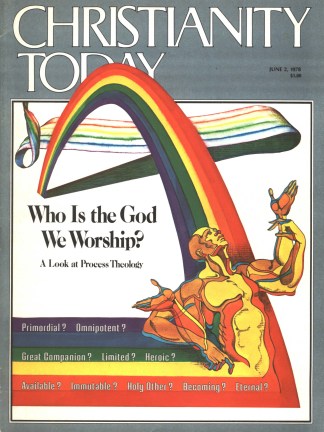Three and a half years after the Lausanne Congress the full forty-nine member committee met for the third time at Willowbank, Bermuda, last January. Under Leighton Ford’s efficient, relaxed and kindly chairmanship we were able to deepen our international fellowship and to transact a great deal of business.
Much of the work of the Lausanne Committee is now being undertaken in the regions and by four working groups. The Strategy Working Group (chairman: Peter Wagner) cooperates closely with MARC (director: Edward Dayton). These two men made an impressive presentation to the committee entitled To Reach the Unreached. Stating that the world now consists of 4.1 billion people (divided into 221 nations) of whom 1 billion name Jesus as Lord, another billion may have heard of him, but 2 billion have never heard his name, they urged that the way to reach such a world is neither one country at a time, nor even primarily one person at a time, but “one people at a time.” Their working definition of an unreached people is a sociological grouping who perceive that they have some affinity with one another—ethnic, linguistic, religious—but are less than 20 per cent practicing Christian. They emphasized the need to identify and describe these peoples accurately, to discover their needs and the degree of their receptivity or resistance to the Gospel, and to seek to meet their needs and communicate the good news to them.
The Intercession Working Group (chairman: Armin Hoppler) is producing an excellent prayer calendar and promoting an annual Day of Prayer for World Evangelization each Pentecost Sunday. The Communications Working Group (chairman: Thomas Zimmerman) is responsible through Stan Izon, our communications director, for the production of both the Information Bulletin and the World Evangelization Information Service, which is received by 1,000 agencies worldwide. Lausanne Occasional Papers are now being published, and will be distributed by a network of Lausanne Literature Coordinators. (In America, inquiries on these publications should be addressed to P.O. Box 1100, Wheaton, Illinois 60187.) I am the chairman of the fourth Working Group, Theology and Education. Its main activities so far have been to arrange the Pasadena Consultation on the “homogeneous unit principle” in June 1977 and the Gospel and Culture Consultation at Willowbank last January. The Pasadena Statement and the Willowbank Report are Lausanne Occasional Papers one and two, respectively.
The Lausanne Committee is now actively preparing a Consultation on World Evangelization (COWE), under the able direction of David Howard, which is to take place somewhere in the Third World from January 12 to 26, 1980. It will stand in the sequence of the Berlin and Lausanne Congresses, but will be a different kind of assembly, particularly because it will be much smaller (300 to 500 people) and during its first week will divide up into perhaps twenty specialist miniconsultations. Its purposes have been defined by the Lausanne Committee in the following terms: “Accepting the nature, basis and framework of Christian mission as revealed in the Scriptures and interpreted in the Lausanne Covenant, and humbly desiring to discern and obey the direction of the Holy Spirit, the Consultation will convene (1) to seek fresh vision and power for the task which Christ has given to his church until he comes, (2) to assess the state of world evangelization, its progress and hindrances, (3) to complete an extended study programme on theological and strategic issues related to world evangelization, already begun in many regions, and to share its results, (4) to develop specific evangelistic strategies related to different unreached peoples, and (5) to review the mandate of the LCWE and the role it might play in furthering these objectives.”
Peter Wagner and I are initiating the pre-COWE study program. Despite the problems, we are both anxious to see some cross-fertilization between theology and strategy. Perhaps it will be possible for at least one strategist to be in each theological group, and one theologian in each strategy group, although to be sure we should not perpetuate this dichotomy but rather engender a new breed of theologian-strategists or strategist-theologians.
The Theology and Education Group was already committed before January to arrange, in cooperation with the Theological Commission of the World Evangelical Fellowship, a Consultation on Simple Life-Style (convenors: Ronald Sider and Horace Fenton) and another on the Teaching of Missions and Evangelism (convenor: Robert Coleman). These will now be incorporated in some way into preparations for COWE. At Bermuda we decided to accept an invitation from WEF’s Theological Commission to share in their projected “Church and Islam” groups (convenor: Bruce Nicholls), and to initiate groups on “Gospel and Spirituality” (how to reach those searching for spirituality or transcendence both in the midst of Western materialism and through Eastern mysticism). Other groups will concern themselves with urban mission, and with our Christian witness to Hindus, Buddhists, Jews, the adherents of traditional Chinese and African Religions, and Marxists. We are now in the process of seeking a coordinator for each cluster of groups.
Whatever their topic of study, the groups will share a common agenda, which will include: an analysis of failure (why has the Gospel made such small headway among the people concerned?); an analysis of success (what approaches have been blessed, and why?); an analysis of the unreached people concerned (identifying them and describing their beliefs, values, receptivity, and resistance to the Gospel); relevant biblical study; and development of an appropriate strategy.
The Lausanne movement stands for “unity in evangelism.” If a worldwide network of groups can engage in serious study during the rest of this year and next, we may have the necessary background understanding by God’s grace to develop specific, realistic strategies for evangelism when COWE convenes in January 1980. Please pray with us toward this end.









